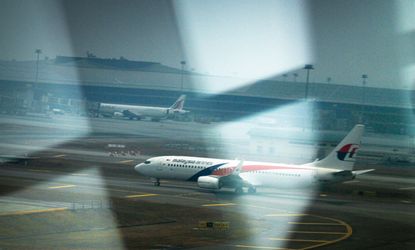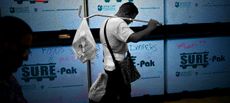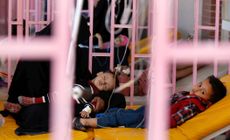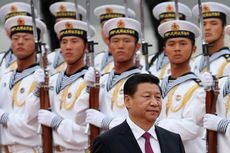After Flight 17, do we need missile defense systems for commercial airliners?


Ben Gurion International Airport is adjacent to a war zone, and so, when a rocket fired by Hamas or its proxies landed in its vicinity on Tuesday, U.S. carriers decided to stop flying there. That's obviously smart and prudent.
Since the mid-1970s, almost a dozen commercial jets have been shot down by missiles. As shoulder-fired missile launchers proliferated, it become easier to envision a scenario in which jets taking off and landing could become prime targets for terrorists. Thriller fiction has beaten that scenario to death since the 1980s.
Counter-measure technology, like heat flares and laser diversion, hasn't been available for jets these large and slow until very recently, which is one reason why the military industrial complex didn't bother to spend time lobbying for access to the commercial passenger markets.
Subscribe to The Week
Escape your echo chamber. Get the facts behind the news, plus analysis from multiple perspectives.

Sign up for The Week's Free Newsletters
From our morning news briefing to a weekly Good News Newsletter, get the best of The Week delivered directly to your inbox.
From our morning news briefing to a weekly Good News Newsletter, get the best of The Week delivered directly to your inbox.
Now, however, companies like Raytheon have figured out how to make counter-measures small and aerodynamically efficient, reducing the drag they exert on the airplane. In normal times, without any disaster to reference, the idea of putting these pods onto planes would be impractical and unwarranted.
Now we have one. And suddenly, the idea just seems less of a stretch. The public will be nervous, and a nervous public is willing accept more extreme solutions to keep them safe.
But it's almost entirely a sham. El-Al has added counter-measure technology to its fleet, but it protects against one type of threat: that of a terrorist who gets access to a shoulder-fired missile launcher and who could find a way to infiltrate the security perimeter of an airport. The chances this will happen are rare, but in Israel, they're not zero, and it makes financial sense to harden the target in places where terrorists have access to Stingers.
In the case of Malaysia Airlines Flight 17, though, the technology used by El-Al wouldn't have done jack squat.
Sign up for Today's Best Articles in your inbox
A free daily email with the biggest news stories of the day – and the best features from TheWeek.com
In fact, the history of airline shoot-downs suggests that the biggest threat comes not from terrorists, but from nation-states waging wars.
Planes are not targeted when they're taking off and landing, even though that's when they're the most vulnerable. They're shot down when they're at cruising altitude — far above the range of MANPADs and their cousins. Far above the range of the chaff designed to foil shoulder-fired missiles.
Nations have more advanced surface-to-air missile systems. They're called systems because they're very complex, often require a half dozen or more people to operate, are much more accurate, and are much deadlier. It is not clear whether the technology that works for smaller gunships in asymmetric war zones (Iraq or Afghanistan) could really protect lumbering commercial airliners from the extremely efficient and accurate air defense systems that Russia, China, and a dozen other states employ.
The missiles themselves have basic counter-counter-measures, and because it's pretty easy for a country to acquire anything made commercially, the missile designers can adapt their tech to counter the tech designed to confuse or alter the missiles' paths through space.
So when Sen. Mark Kirk (R-Ill.) says that "it's not too technically difficult to add a radar warning system on aircraft, where a pilot in command could dispense chaff to defeat a radar-guided missile," he is telling a very minimalist version of the truth.
Indeed, you can put the stuff on there. You can train pilots to use them, although I think the training would be fairly disruptive and probably rejected by many pilots who don't see themselves as militaristic. But the only system that's been successfully tested, at least in unclassified settings, is the special laser diversion apparatus designed to protect El-Al planes as they take off and land.
The rest is just a fantasy. It's security theater of a different sort.
Create an account with the same email registered to your subscription to unlock access.
Marc Ambinder is TheWeek.com's editor-at-large. He is the author, with D.B. Grady, of The Command and Deep State: Inside the Government Secrecy Industry. Marc is also a contributing editor for The Atlantic and GQ. Formerly, he served as White House correspondent for National Journal, chief political consultant for CBS News, and politics editor at The Atlantic. Marc is a 2001 graduate of Harvard. He is married to Michael Park, a corporate strategy consultant, and lives in Los Angeles.
-
 'Make legal immigration a more plausible option'
'Make legal immigration a more plausible option'Instant Opinion Opinion, comment and editorials of the day
By Harold Maass, The Week US Published
-
 LA-to-Las Vegas high-speed rail line breaks ground
LA-to-Las Vegas high-speed rail line breaks groundSpeed Read The railway will be ready as soon as 2028
By Peter Weber, The Week US Published
-
 Israel's military intelligence chief resigns
Israel's military intelligence chief resignsSpeed Read Maj. Gen. Aharon Haliva is the first leader to quit for failing to prevent the Hamas attack in October
By Justin Klawans, The Week US Published
-
 Why Puerto Rico is starving
Why Puerto Rico is starvingThe Explainer Thanks to poor policy design, congressional dithering, and a hostile White House, hundreds of thousands of the most vulnerable Puerto Ricans are about to go hungry
By Jeff Spross Published
-
 China is now just another autocracy
China is now just another autocracyThe Explainer On the long-lasting consequences of Xi Jinping's power grab
By Noah Millman Published
-
 Is America the main obstacle to peace in Korea?
Is America the main obstacle to peace in Korea?The Explainer There's only one way Korea would unify — and the United States won't stand for it
By Noah Millman Published
-
 Why on Earth does the Olympics still refer to hundreds of athletes as 'ladies'?
Why on Earth does the Olympics still refer to hundreds of athletes as 'ladies'?The Explainer Stop it. Just stop.
By Jeva Lange Last updated
-
 Berlin's wall and ours
Berlin's wall and oursThe Explainer What that signifier of the Cold War indicates about our unsettled historical moment
By Noah Millman Published
-
 The catastrophe in Yemen
The catastrophe in YemenThe Explainer A Saudi Arabian blockade has left millions of civilians starving, and without fuel or clean water. What is this conflict about?
By The Week Staff Published
-
 China's strongman
China's strongmanThe Explainer Xi Jinping is China's most powerful leader in decades. What are his plans for the country — and the world?
By The Week Staff Published
-
 How to ride out the apocalypse in a big city
How to ride out the apocalypse in a big cityThe Explainer So you live in a city and don't want to die a fiery death ...
By Eugene K. Chow Published